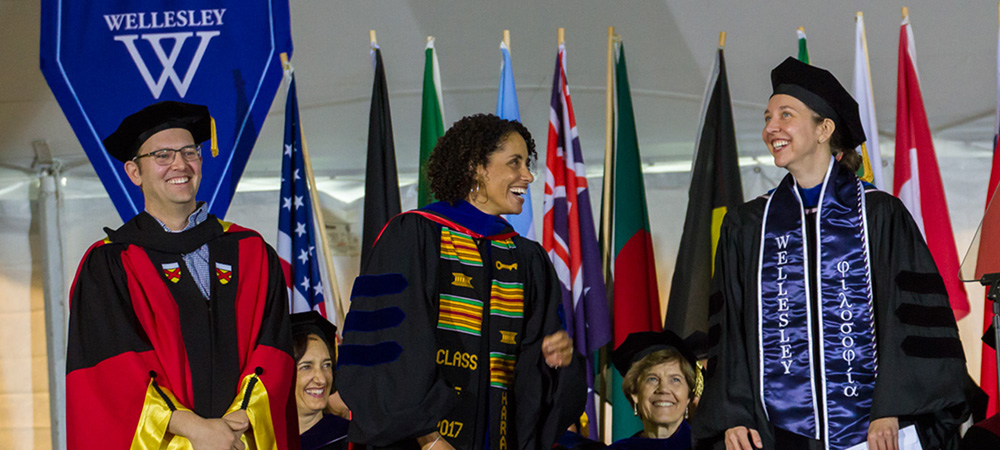
Citations for the 2017 Pinanski Prize winners
Corinne Gartner, philosophy
With intelligence, enthusiasm, and compassion, Corinne Gartner helps her students probe life’s most profound questions, guiding them on a tour, as one student put it, of everything from the nature of the soul to what defines “the good life” to how ancient philosophers conceptualized death. As an assistant professor of philosophy, Professor Gartner touches the lives of all her students, majors and nonmajors alike, often tapping an undiscovered passion for philosophy and expanding and sharpening how her students understand and interact with the world. She “helped me grow as a philosopher” in and out of class, said one student.
Professor Gartner’s students describe her approach to teaching as one defined by responsiveness, inclusivity, and empathy. She “inspires [us] to reach further and believe in [ourselves]” and she “fosters and strengthens [our] ability to engage critically with the world,” they said. Professor Gartner is deeply invested in her students’ well-being and sees them as equals. Perhaps most importantly, she is “steadfastly devoted” to teaching to every conceivable learning style and knowledge base—she listens to her students and adapts her teaching to their needs.
For all the ways she opens students to new ways of seeing, thinking, and learning, it is an honor to present Corinne Gartner with the Anna and Samuel Pinanski Teaching Prize.
Brenna Greer, history
History is alive, dynamic, compelling, and made “deeply personal” in Brenna Greer’s classes. Her teaching is grounded in her ability to create powerful encounters with the past that illuminate the present. Professor Greer’s teaching, students agree, makes them stronger writers, more agile in their thinking, and more open to ideas from all viewpoints.
The Knafel Assistant Professor of Social Sciences and assistant professor of history, Professor Greer teaches courses on topics such as Cold War culture and politics, the 20th-century Black freedom struggle, and consumer culture and citizenship.
Among her many gifts as a master educator is her ability to help students become deep thinkers and astute investigators. “She weaves the ideas of scholars, historical events, and the thoughts of her students together to teach us about the world and ourselves,” said one student. She encourages her students to “challenge” what they learn and “to find deeper connections” within course materials, said another.
Professor Greer’s teaching exemplifies the best qualities of the Wellesley liberal arts tradition. “She made my liberal arts experience fully interdisciplinary,” said a math and computer science student. “I realized I could be a historian, too.” Another student said Professor Greer showed her how to “build connections between the humanities and other fields.”
For her innovative teaching and her relentless dedication to empowering all students, it is an honor to present Brenna Greer with the Anna and Samuel Pinanski Teaching Prize.
Andrew Schultz, mathematics
From inspired teaching to dedicated service to his department, Associate Professor of Mathematics Andrew Schultz has brought new energy and creative ideas to Wellesley. Professor Schultz is a beloved faculty member who brings challenging mathematical concepts into sharp focus for his students and who is admired by his colleagues for his departmental contributions. “His eagerness to answer questions and his ability to present mathematics as a dialogue rather than a lecture…allowed me to marvel at the subject,” said one student. “He instilled within me a passion for abstract mathematics, a feat I did not believe possible.”
Colleagues say Professor Schultz’s invigorating spirit has energized the department. “While he is an algebraist by training, he came to Wellesley immediately began teaching and creating courses not only in his own discipline but in more distant fields like numerical analysis,” said a fellow professor. “His popularity among the student population spills from lecture-based courses to independent studies, theses, and research projects.”
Under Professor Schultz’s supervision, more Wellesley students than ever have entered the prestigious William Lowell Putnam Mathematical Competition, reigniting Wellesley’s participation in the famously difficult contest.
For challenging his students to reach new heights, for outstanding service to the College, and for sharing his gift of teaching math as a dialogue, it is an honor to present Andrew Schultz with the Anna and Samuel Pinanski Teaching Prize.
